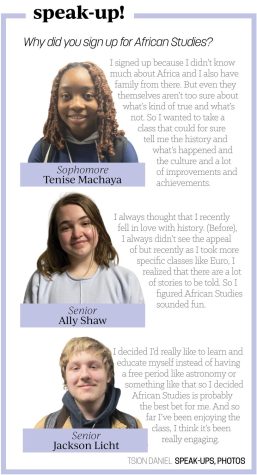 Could you briefly describe what the new African Studies class is?
Could you briefly describe what the new African Studies class is?
This year we’re experimenting with building the African history class, which is a study of Africa itself and the history of Africa. So it expands on the kind of history we talked about when everybody was a freshman in world history, which was brief. We talked about the western kingdoms like Songhai, Mali and Ghana and we talked about Egypt. Then, we usually talked about the slave trade and then maybe got into post-colonialism in the 1900s. Now, we’re going to expand into all the history in Africa and show how African history is more individualized than just Africa’s connections to other bigger histories. Africa has an individual history in itself, which is what this new class is going at, rather than Africa as a product of connection to Europe as a product of connection to Asia. Also, Africa is a continent and not a country. It has a lot of diverse cultures and a lot of diverse history and language groups so this class is really just getting the whole experience of understanding the history of Africa from its beginning to its modern age.
Are there any prerequisites you have to take before this class? What’s the weight of the class?
There’s no weight yet for this class, but we’re looking, probably in the future, to see if that’s possible. But right now, it’s just a regular history elective if people want to take it. There’s no previous requirements and there’s no class you have to take in the process.

What are some main ideas or topics taught in the class?
For the last few weeks, what we’ve really been focused on is first understanding why the history of Africa has been absent in other history curriculums. We’re also looking at the geography of the continent and how diverse it is with the diverse regions and separated cultures to create different cultural hearths so that we can set ourselves up for when we get to the history of the West, Central, North, East and South of the continent. We can understand the myths that developed in the last hundred years and break those apart so we can kind of have a fresh understanding and take a deeper look into what makes each region different. For example, the different histories are based on the geography of the region. There’s a whole lot of other stuff we’re going to touch base on.
Why was this class implemented?
The African History and Culture Club were looking to expand the knowledge of Africa in general that gets missing in a lot of our textbooks and missing in a lot of our general studies classes. They just wanted more specific information about African history in the class. So really, a lot of the credit goes to the African History and Culture Club for really pushing this and creating and crafting the vision of it and helping with the curriculum. I took a lot of advice from them, like what they were looking for and what they wanted to know about.
What is your favorite part of the class?
I like the newness of it. Right now, we’re in a time period where the history of Africa is becoming more and more uncovered. Like archaeology, we’re learning as we go and the world is also learning as we go so we’re getting new information as we go. One thing that we’re looking at maybe doing (for the new class) is a planetarium show that just came out about African astronomy. We have some guest speakers that are coming in with different expertise and different subjects. I’m really excited about the whole structure and the newness of the class.
How is this class special or different from other history classes?
I think that if people are looking for a new history class or a new field of history, especially if they’re interested in going into history, this is the class for you. If they’re looking for something unique and different–that is now becoming a bigger global issue–and if they’re looking to make connections to a continent that’s really inspired a lot of critical connections to the world, then this is the class to take.



















![Joseph Broman, Mu Alpha Theta sponsor, grades tests for his honors precalculus/trigonometry class. Broman said, “I’m retiring from the Math Club next year and I’m just going to do Mu Alpha Theta so I can focus on that one and we can do more [speaker series] first semester.”](https://hilite.org/wp-content/uploads/2024/03/IMG_9502-1200x900.jpg)











![British royalty are American celebrities [opinion]](https://hilite.org/wp-content/uploads/2024/03/Screenshot-2024-03-24-1.44.57-PM.png)




















![Review: “The Iron Claw” cannot get enough praise [MUSE]](https://hilite.org/wp-content/uploads/2024/04/unnamed.png)
![Review: “The Bear” sets an unbelievably high bar for future comedy shows [MUSE]](https://hilite.org/wp-content/uploads/2024/03/unnamed.png)
![Review: “Mysterious Lotus Casebook” is an amazing historical Chinese drama [MUSE]](https://hilite.org/wp-content/uploads/2024/03/0.webp)
![Thea Bendaly on her Instagram-run crochet shop [Biz Buzz]](https://hilite.org/wp-content/uploads/2024/03/IMG_0165-1200x838.jpg)
![Review: Sally Rooney’s “Normal People,” is the best book to read when you are in a time of change [MUSE]](https://hilite.org/wp-content/uploads/2024/03/20047217-low_res-normal-people.webp)
![Review in Print: Maripaz Villar brings a delightfully unique style to the world of WEBTOON [MUSE]](https://hilite.org/wp-content/uploads/2023/12/maripazcover-1200x960.jpg)
![Review: “The Sword of Kaigen” is a masterpiece [MUSE]](https://hilite.org/wp-content/uploads/2023/11/Screenshot-2023-11-26-201051.png)
![Review: Gateron Oil Kings, great linear switches, okay price [MUSE]](https://hilite.org/wp-content/uploads/2023/11/Screenshot-2023-11-26-200553.png)
![Review: “A Haunting in Venice” is a significant improvement from other Agatha Christie adaptations [MUSE]](https://hilite.org/wp-content/uploads/2023/11/e7ee2938a6d422669771bce6d8088521.jpg)
![Review: A Thanksgiving story from elementary school, still just as interesting [MUSE]](https://hilite.org/wp-content/uploads/2023/11/Screenshot-2023-11-26-195514-987x1200.png)
![Review: When I Fly Towards You, cute, uplifting youth drama [MUSE]](https://hilite.org/wp-content/uploads/2023/09/When-I-Fly-Towards-You-Chinese-drama.png)
![Postcards from Muse: Hawaii Travel Diary [MUSE]](https://hilite.org/wp-content/uploads/2023/09/My-project-1-1200x1200.jpg)
![Review: Ladybug & Cat Noir: The Movie, departure from original show [MUSE]](https://hilite.org/wp-content/uploads/2023/09/Ladybug__Cat_Noir_-_The_Movie_poster.jpg)
![Review in Print: Hidden Love is the cute, uplifting drama everyone needs [MUSE]](https://hilite.org/wp-content/uploads/2023/09/hiddenlovecover-e1693597208225-1030x1200.png)
![Review in Print: Heartstopper is the heartwarming queer romance we all need [MUSE]](https://hilite.org/wp-content/uploads/2023/08/museheartstoppercover-1200x654.png)























![Review: Ladybug & Cat Noir: The Movie, departure from original show [MUSE]](https://hilite.org/wp-content/uploads/2023/09/Ladybug__Cat_Noir_-_The_Movie_poster-221x300.jpg)

![Review: Next in Fashion season two survives changes, becomes a valuable pop culture artifact [MUSE]](https://hilite.org/wp-content/uploads/2023/03/Screen-Shot-2023-03-09-at-11.05.05-AM-300x214.png)
![Review: Is The Stormlight Archive worth it? [MUSE]](https://hilite.org/wp-content/uploads/2023/10/unnamed-1-184x300.png)

